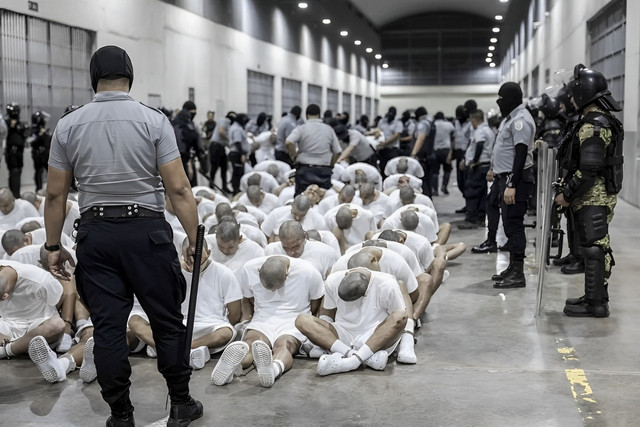Tentang KamiPedoman Media SiberKetentuan & Kebijakan PrivasiPanduan KomunitasPeringkat PenulisCara Menulis di kumparanInformasi Kerja SamaBantuanIklanKarir
2025 © PT Dynamo Media Network
Version 1.101.0
Konten dari Pengguna
US Supreme Court Approves Trump Deportation Immigrants Through Alien Enemie Act
14 April 2025 9:17 WIB
·
waktu baca 10 menitTulisan dari Husen Muhammad tidak mewakili pandangan dari redaksi kumparan

ADVERTISEMENT
The United States Supreme Court recently issued a controversial ruling allowing President Donald Trump to proceed with deportation efforts against Venezuelan immigrants under the Alien Enemies Act, an antiquated statute that has been rarely invoked since the World War era. The vote was narrowly decided, 5 to 4.
ADVERTISEMENT
Brief History and Use of the Alien Enemies Act
Alien Enemies Act enacted in 1798, grants the President special powers during times of war, including the authority to detain or deport individuals from enemy nations—whether they are lawful permanent residents or foreign nationals. Under this statute, the President may take action against immigrants based solely on their country of origin or nationality, without the need for judicial proceedings. Originally intended as a preventive measure against threats such as espionage and sabotage by foreign actors during times of conflict, the law has also been applied to individuals who are legally residing in the United States, many of whom pose no actual threat to national security. The sweeping powers granted under this act have raised concerns about potential conflicts with constitutional principles and the risk of misuse, particularly when invoked outside the context of an official war.
ADVERTISEMENT
Alien Enemies Act (AEA) of 1798 stands as one of the more controversial legal instruments in U.S. history, particularly due to its use during World War II. At that time, the federal government invoked the AEA to detain thousands of individuals of Japanese descent including American citizens without due process or concrete evidence linking them to any national security threats. The Act grants the President broad authority to take action against foreign nationals from enemy nations, including detention and deportation, even in the absence of judicial proceedings.
In more recent history, the AEA resurfaced during the 2016 presidential election, when President Donald Trump referenced the statute as a legal foundation for implementing travel bans on citizens from several Muslim-majority countries. This move sparked widespread controversy and raised serious concerns over the potential for executive overreach and the misuse of presidential power.
ADVERTISEMENT
Over time, many have argued that the Alien Enemies Act is no longer aligned with the principles of a modern rule-of-law state. Its continued existence is seen as redundant, overlapping with various contemporary laws and regulations that are better equipped to address foreign threats in a more precise and just manner. As a result, a number of policy experts have called for a reevaluation of the AEA, especially considering that today’s geopolitical landscape and national security needs differ significantly from those of the 18th century.
Alien Enemies Act grants the President of the United States special authority to take action against foreign nationals from enemy countries, but its enforcement is subject to specific conditions. The law can only be invoked during a formally declared war or in the event of an invasion or sudden attack on U.S. territory..
ADVERTISEMENT
Within the U.S. constitutional system, the power to declare war is explicitly granted to Congressnot the President. This means that the enforcement of the Alien Enemies Act based on a declared war requires a deliberative process involving debate and a formal vote in the legislative branch. However, in emergency situations such as an imminent invasion or an unannounced armed attack, the President holds inherent executive authority to respond immediately without waiting for Congressional approval.
This authority includes the President’s unilateral discretion to determine when a foreign military action constitutes a credible threat. As a result, although the law operates within a legal framework, its application still allows for broad interpretation and executive discretion. This has sparked ongoing debate over the limits of presidential power in matters of national security and the protection of civil liberties during times of crisis.
ADVERTISEMENT
Controversy Over the Use of the Alien Enemies Act: Between National Security and Human Rights
The enforcement of this law has raised serious concerns among various groups, including human rights advocates and several Democratic lawmakers, who argue that the policy is discriminatory and potentially violates fundamental principles of immigration justice. On the other hand, Trump supporters view the move as part of a broader effort to tighten border security and protect national sovereignty. The Supreme Court’s decision not only has immediate consequences for thousands of immigrants but also reignites a broader national debate over how the United States navigates immigration issues within a complex legal and political landscape..
The petition sought to overturn a prior ruling by District Judge James Boasberg, who had blocked the application of the Alien Enemies Act against five Venezuelan nationals who had filed a legal challenge. The Supreme Court’s decision effectively reopens the door for enforcement of the law, which has long been controversial for granting broad executive authority in immigration deportation policies.
ADVERTISEMENT
Criticism of the Alien Enemies Act extends beyond legal concerns, touching on ethical and human rights dimensions as well. Many argue that the use of this law especially without proper due process risks violating core principles of justice and non-discrimination that are foundational to the American legal system. On the other hand, supporters of the policy contend that the government has the right to take decisive action to protect national security from potential external threats.
In response to this situation, advocacy groups and civil society organizations have called for greater oversight of how the Alien Enemies Act is implemented moving forward. They emphasize the need to strike a careful balance between national security interests and the protection of individual rights, particularly for those most vulnerable to abuse of power.
ADVERTISEMENT
The Supreme Court's decision underscores that immigration policy and executive authority remain central issues in U.S. public discourseespecially in the evolving political climate of the Trump era. Looking ahead, the debate over the limits of government power and the safeguarding of human rights is expected to intensify, as the country continues to grapple with how to enforce the law without compromising the principles of justice and humanity.
Debate Over the Application of the Alien Enemies Act to Venezuelan Migrants
In a recent ruling that has attracted significant public attention, the court ordered that Venezuelan migrants be provided with adequate notice and a reasonable period of time before being deported under the Alien Enemies Act, giving them the opportunity to file legal objections. This provision is seen as a significant limitation on the way the law has been used, as it has long been a controversial tool in immigration policy and national security.
ADVERTISEMENT
In a recent decision that has attracted significant public attention, the court ordered that Venezuelan migrants be provided with adequate notice and a reasonable amount of time before being deported under the Alien Enemies Act, ensuring they have an opportunity to challenge the legality of their deportation. This provision is seen as a significant limitation on the way the law has been applied, which has long been a controversial tool in immigration policy and national security.
The case revolves around a tension between two branches of government: the executive and the judiciary. The government, in its attempt to deport over a hundred Venezuelan nationals suspected of being part of transnational criminal groups, relied on the Alien Enemies Act as a legal basis, citing a situation of "invasion" and "predatory attack" that it claimed was ongoing. This 18th-century law grants the President broad authority to detain or deport nationals from countries deemed enemies, either during a declared war or in the event of a direct threat to national security.
ADVERTISEMENT
However, the government's actions met resistance from lawyers and human rights organizations. They argued that the deportation process was carried out without allowing sufficient time for individuals to legally challenge the actions, potentially violating principles of due process and human rights. Some judges in their dissenting opinions even described the government's actions as "suspicious" and noted that it provided "extraordinary leniency" without any evidence of concrete harm to be faced by the migrants. Strong criticism was also directed at the use of emergency procedures in the Supreme Court, which expedited the decision-making process without open hearings or full arguments.
In one opinion, the appeals court noted that the government's deportation plan had ignored even the most basic legal procedures for migrants’ rights. Several lawyers emphasized that, without judicial intervention, the migrants were at risk of being deported to El Salvador, a country that had signed an agreement with the government to accept and detain them without guarantees of rights or access to judicial oversight. Some reports indicated that deported migrants were held in facilities notorious for human rights abuses, with no access to communication.
ADVERTISEMENT
While the government did not deny the importance of judicial review, the main debate revolved around jurisdiction and the appropriate venue for legal challenges. The government argued that the lawsuit should have been filed where the migrants were initially detained, in Texas, rather than in the federal courts in Washington, D.C., where the original lawsuit was filed. The government also denied allegations that the migrants would face torture, reaffirming its commitment to anti-torture principles in foreign policy and law enforcement.
This case represents one in a series of emergency efforts by the government to gain legitimacy for the use of the Alien Enemies Act in a modern context. Beyond immigration issues, the case highlights the deep tension between executive power to safeguard national security and the protection of constitutionally guaranteed human rights. Moving forward, discussions about the limits of using colonial-era laws like the Alien Enemies Act are expected to continue, particularly in the context of increasing concerns about the potential abuse of power in immigration policy and law enforcement.
ADVERTISEMENT
As a student, I view the U.S. Supreme Court's decision to allow President Donald Trump to apply the Alien Enemies Act to Venezuelan immigrants as a highly controversial step, with the potential to open the door to executive overreach. Although the law is legally valid, its origins in the 18th century make it no longer relevant to the current socio-political context and modern legal principles that uphold human rights and procedural justice. The use of the Alien Enemies Act in situations that do not meet the criteria of "official war" or "real invasion" reflects a loosening of presidential powers that should be carefully guarded in a democracy. I believe that mass deportation policies carried out without due legal process not only contradict human rights values but also weaken the credibility of the U.S. judicial system as a democratic nation. The Supreme Court should serve as a check on executive power, rather than reinforcing it by opening the door to the use of outdated, inhumane laws. Moving forward, it is important for civil society and the judiciary to continue scrutinizing and revisiting laws that could undermine justice, ensuring that the law serves as a protector of the people, not an instrument of oppression.
ADVERTISEMENT
Muhammad Husen, International Relations Student, Universitas Tanjungpura, Pontianak

